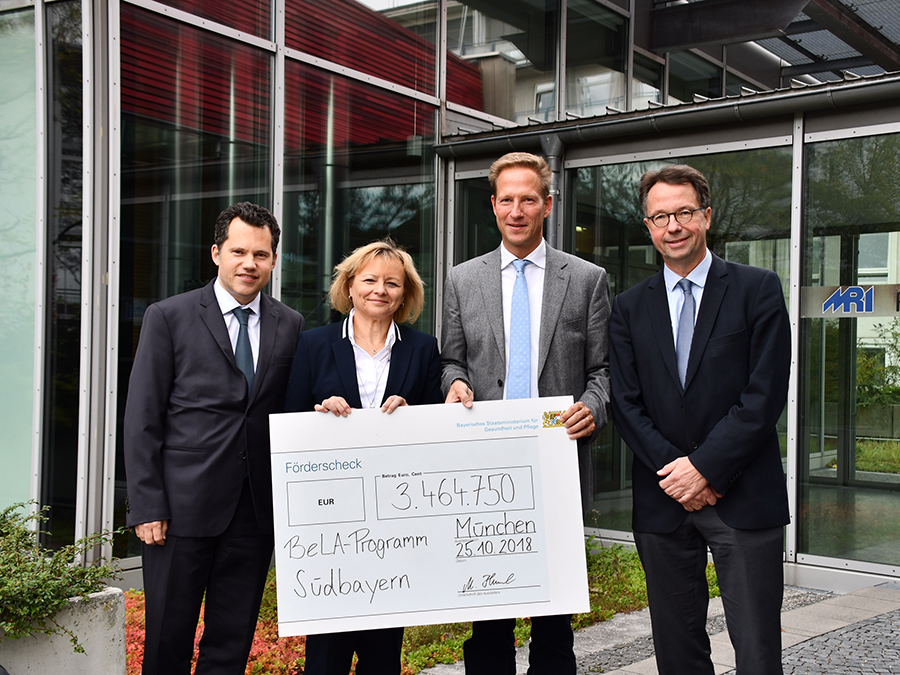New TUM training program combats shortage of country doctors
Placing medical students in small-town practices

Despite numerous openings and affordable housing, few next-generation physicians decide to take the primary care route and go on to practice as family doctors in rural settings. Thus the new research and teaching project for rural outreach in primary care medicine, called “Beste Landpartie Allgemeinmedizin” (BeLA) and funded by the Bavarian State Ministry of Health and Care, aims to attract interested students to this field at an early stage. The 2018/2019 winter semester heralds the start of this project at the TUM School of Medicine’s teaching hospitals and practices in the participating regions.
Northern Bavaria becomes part of the program
Health Minister Huml, who could not be there in person due to coalition negotiations, emphasizes on the occasion of the event: “My aim is to attract more young doctors to small towns. Through the BeLA project, we are supporting seven pilot regions altogether – three in southern Bavaria and four in the north of the state – to the tune of around 5.8 million euros over the coming four years. This is intended to bridge the journey from university to rural practice for young physicians.”
A joint initiative between TUM and the Friedrich-Alexander University of Erlangen-Nuremberg (FAU), the BeLA project was initially launched in July 2018 in the southern Bavarian locations of Mühldorf am Inn and Eichstätt/Kösching. In Dillingen, this program is an extension of the successful “AKADemie Dillingen” training scheme already supported by the Bavarian Ministry of Health. In northern Bavaria, BeLA kicked off in the pilot regions of Forchheim/Ebermannstadt, Kulmbach/Stadtsteinach, Weissenburg/Gunzenhausen and Schesslitz/Burgebrach on October 1 this year.
As the Minister enthusiastically explains: “Program highlights include strong support for medical students in teaching hospitals and primary care practices as well as complementary activities to promote regional engagement, such as local accommodation, project work, after-hours and emergency care at weekends, additional practical training and hands-on mentoring. The aim is to ensure our prospective physicians forge a strong connection with both primary care medicine and the local community throughout their studies.”
Excellent training with room and board
BeLA supports students with an accompanying program of seminars and mentoring in primary care medicine from their first clinical semester onwards. In addition, the participating hospitals and primary care practices offer them internships, block placements and the one-year practical internship (“Praktisches Jahr”) – with free accommodation and meals included. The students also receive grants of 600 euros per month if they undertake to complete their specialist training in primary care medicine in the relevant region after graduation.
Johannes Rödig has already signed up to the program. He is studying medicine in Würzburg but is keen to move closer to his rural home district of Traunstein, to work as a family doctor there. When applying to spend his practical year in the neighboring district of Mühldorf, he found out about the local hospital’s participation in BeLA. “For me, this program is a perfect fit. It means that during my year-long placement, I can already start building contacts with my future colleagues at the hospital and local practices, while also receiving financial support. All of which should really smooth my professional path after graduation,” he affirms.
Predecessor project a clear success
BeLA builds on TUM’s existing funding project: AKADemie Dillingen, which was smaller in scope but highly successful. Of 14 participants, five decided to continue with primary care in Dillingen, one stayed on as a surgeon, and four others also chose to pursue primary care paths but are working in urban locations.
“The students really get to know the area and the local community, receive valuable medical training and mentoring from hospital physicians and primary care practitioners, and experience the full spectrum of medical care. The program is very flexible and supports students over a long period – these are its key strengths,” explains Prof. Antonius Schneider, Chair of TUM’s Institute of General Practice – the first of its kind in Bavaria – and organizer of the program, which he developed together with Prof. Pascal Berberat from the TUM Medical Education Center.
More information
- Professor profile for Antonius Schneider
- Professor profile for Pascal Berberat
- TUM Institute of General Practice and Health Services Research (in German only)
- TUM Medical Education Center
Contact
Prof. Antonius Schneider
Technical University of Munich
Institute of General Practice
Phone: +49 (0)89 6146589-11
antonius.schneider@tum.de
Johannes Rödig (available for interviews from November 8 and potentially willing to be filmed over a longer period)
joroedig@googlemail.com
Technical University of Munich
Corporate Communications Center
- Dr. Vera Siegler
- vera.siegler@tum.de
- presse@tum.de
- Teamwebsite